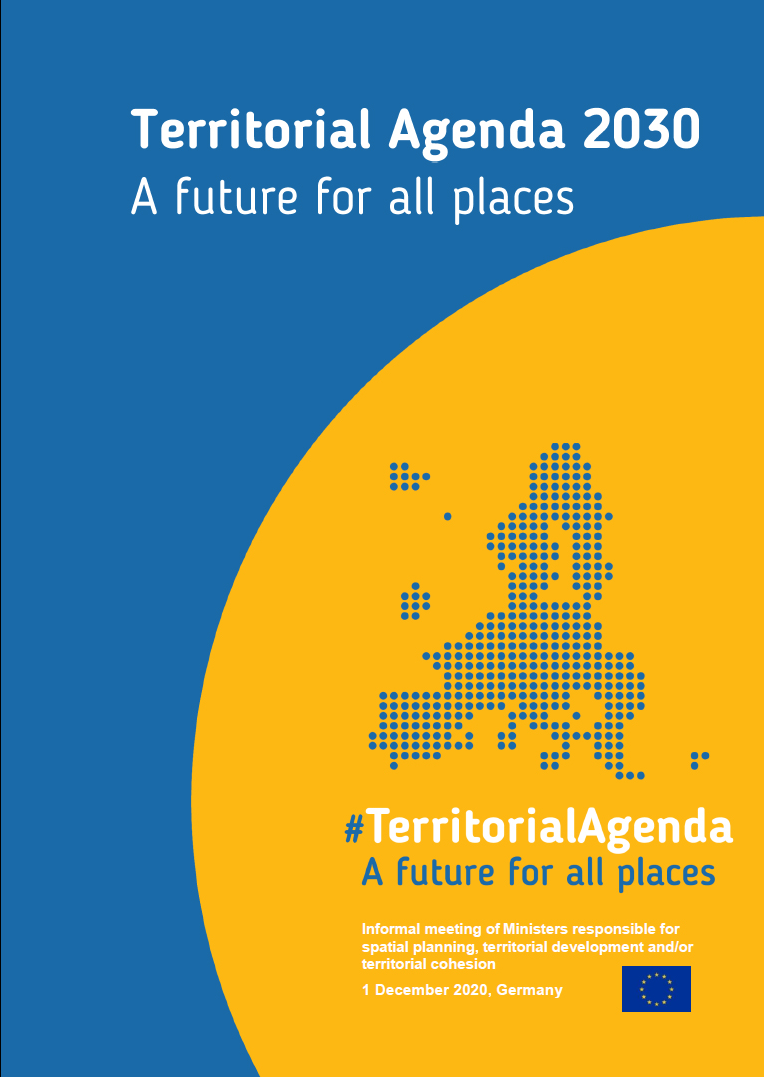Territorial Agenda 2030

 The Territorial Agenda 2030 underlines the importance of and provides orientation for strategic spatial planning and calls for strengthening the territorial dimension of sector policies at all governance levels.
The Territorial Agenda 2030 underlines the importance of and provides orientation for strategic spatial planning and calls for strengthening the territorial dimension of sector policies at all governance levels.
It seeks to promote an inclusive and sustainable future for all places and to help achieve Sustainable Development Goals in Europe.
Therefore, it defines two overarching objectives, a Just Europe and a Green Europe, which have six priorities for developing the European territory as a whole, along with all its places.
Background documents
The renewal of the Territorial Agenda builds on wide range of documents. The starting point is the current Territorial Agenda of the European Union 2020 (TA 2020) agreed by the Ministers responsible for Spatial Planning and Territorial Development in 2011. It updated and reviewed the first Territorial Agenda of the European Union (TAEU) from 2007, which in turn based itself on the European Spatial Development Perspective (ESDP) from 1999.
Atlas for the Territorial Agenda 2030
An important evidence document underpinning the renewal process is the Atlas for the Territorial Agenda 2030.
The atlas illustrates selected aspects of spatial development in Europe. It focuses on the most important areas of action in the Territorial Agenda 2030: the overarching spatial objectives of a Just Europe and a Green Europe; differences in demographic change and migration; competitiveness of cities and regions; and trends related to the enviornment and natural resources. The atlas also contains a wealth of information on spatial features and structures.
Policy documents
The Territorial Agenda takes into consideration the recent developments described in various reports by the European Commission, the European Committee of the Regions, the European Investment Bank and ESPON. It takes into account main recent policy frameworks and agendas, including the United Nations’ 2030 Agenda for Sustainable Development and the Sustainable Development Goals (2015), the Paris Agreement (2015), the United Nations’ New Urban Agenda (2016), the European Commission’s reflection paper ‘Towards a Sustainable Europe by 2030’ (2019), the proposal for the future of Cohesion Policy (2019), the Urban Agenda for the EU (2016), the revised Leipzig Charter (2020), the Cork 2.0 Declaration on a Better Life in Rural Areas (2016), the OECD’s Principles on Urban Policy and on Rural Policy (2019) and the European Green Deal (2019).
Territorial evidence
Recent developments and studies by e.g. ESPON, the European Commission, the European Committee of the Regions, the European Investment Bank and other international, national and regional players, show that Europe faces major challenges but also has great potential. This requires policy responses with a strong territorial dimension and coordinated approaches acknowledging and utilising the diversity of places and their specificities. Among the key documents studied are:
- Territorial Reference Framework by ESPON (read more)
- European Territorial Review by ESPON (read more)
- Geography of EU discontent by DG REGIO (read more)
- 8th report on economic, social & territorial cohesion (Read the full report : in English, in French, in German)
- OECD note on public investment (OECD note in English)
Video on the Territorial Agenda 2030
Download the video here


